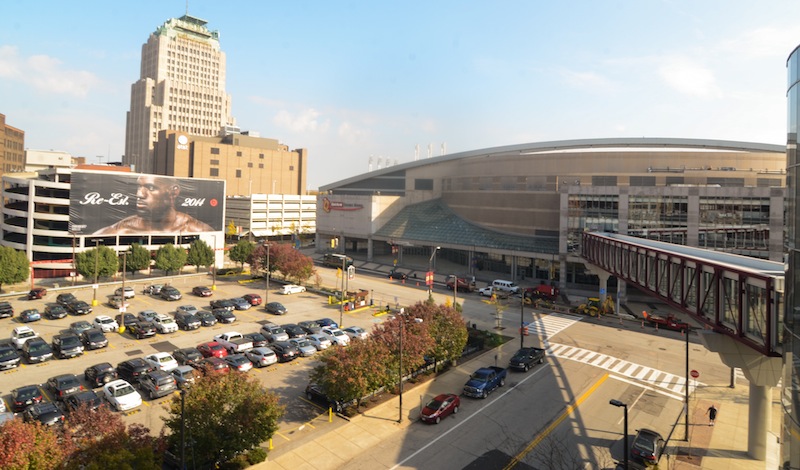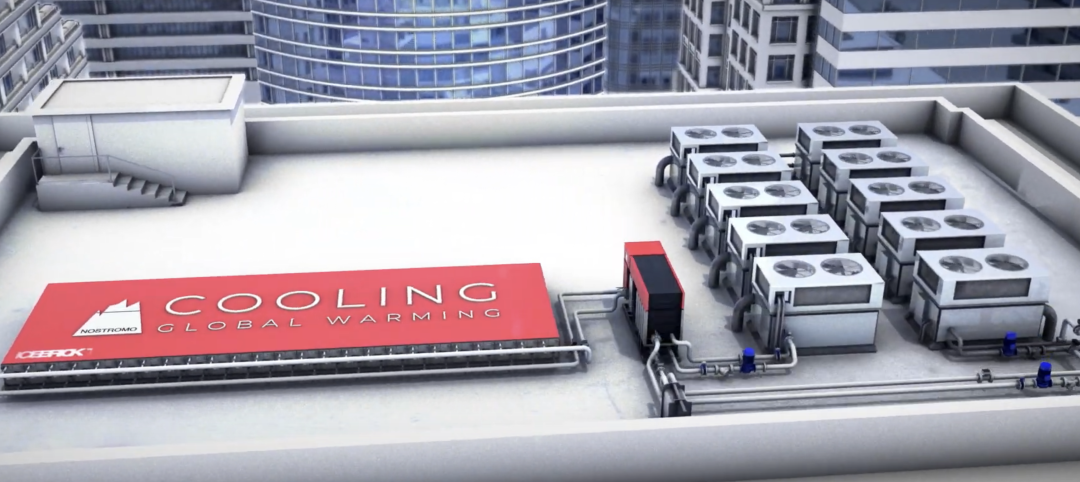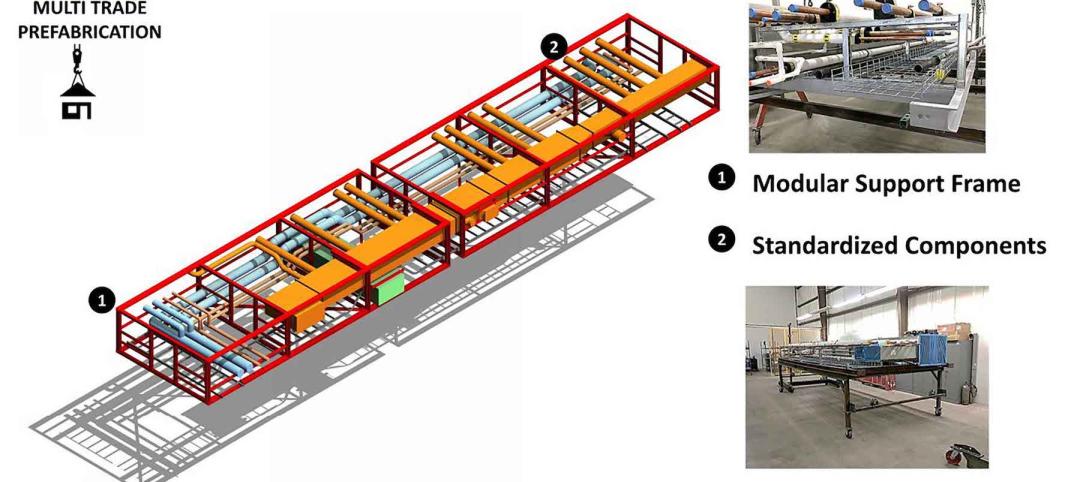Many of us have been frustrated at trade shows or sporting events where your cellphone can’t get reception because too many other people there were trying to use theirs at the same time?
Now consider the Republican and Democratic National Conventions, to be held over the next few weeks in Cleveland and Philadelphia. Each event is expected to attract something like 20,000 delegates, guests, and media, virtually all of whom will be using their cellphones to make calls, send texts and tweets, up- and download videos and images, and check social media sites, often minute-by-minute or even second-by-second.
The wireless networks at Quicken Loans Arena in Cleveland and the Pennsylvania Convention Center (which will continue to be open to the public during the Democratic event) expect to be able to handle this traffic thanks to distributed antenna systems (DAS) supplied by SOLiD, whose ALLIANCE product can support multiple carriers and public safety bands to ensure reliable connectivity in the buildings and surrounding venues and transportation centers.
DAS technology extends a building’s existing’s wireless coverage where it’s needed, so people can stay connected everywhere. SOLiD’s ALLIANCE product line provides robust edge densification to the carrier networks, “and gives them enough power to reach the handset and handle more traffic,” says Ken Sandfeld, president of SOLiD’s Americas division, based in Sunnyvale, Calif. “This year’s political conventions are the most connected and reliable in history.”
SOLiD has been installed in Quicken Loans’ arena for three years, and in 2015 underwent a major upgrade to 5-watt remotes, from 1-watt units, in order to accommodate extra carriers. (It’s not uncommon for mobile carriers to join a DAS at a large venue in anticipation of a big event where they expect a lot of their subscribers will attend.)
There are now 76 SOLiD ALLIANCE DAS units installed at Quicken Loans Arena, where the Republicans’ shindig kicks off on July 18. Verizon operates the network (built by Henkel), and is one of four carriers, along with Sprint, AT&T, and T-Mobile. Additional zones have been added to the DAS to address foot traffic on the floor of the arena during the convention. (AT&T has also been working on improving its bandwidth and reception inside the arena.)

Fifty-eight 20-watt DAS units, supplied by SOLiD, have been installed throughout the 2.2-million-sf Pennsylvania Convention Center in Philadelphia, where the Democrats will hold their presidential convention. Image: Wikimedia Commons
SOLiD is new to the massive Pennsylvania Convention Center, where the Democratic convention starts on July 25. The DAS network there covers 2.2 million sf, and includes 58 SOLiD ALLIANCE 20-watt DAS units installed for radio-frequency coverage. InSite Wireless built and owns the network. T-Mobile will cover the full facility, while AT&T will cover the lower levels of the convention center and the lower level of the nearby Reading Terminal Market.
Sandfeld anticipates that, with the proliferation of wireless devices, DAS installations will become more common, and not just in large venues or stadiums. “In the last few years, high-definition streaming video alone has been driving massive amounts of capacity needs. The number of instances where carriers are connecting [to DAS systems] is growing. And the systems are getting cheaper. I can see a time when all buildings have a system.”
However, not every building is a candidate for DAS unless a carrier is in the picture. That’s why Sandfeld recommends that developers and property managers that are considering DAS find experienced partners “that know how to work with carriers.”
Related Stories
Smart Buildings | Jul 25, 2024
A Swiss startup devises an intelligent photovoltaic façade that tracks and moves with the sun
Zurich Soft Robotics says Solskin can reduce building energy consumption by up to 80% while producing up to 40% more electricity than comparable façade systems.
Codes and Standards | Jul 25, 2024
GSA and DOE select technologies to evaluate for commercial building decarbonization
The General Services Administration and the U.S. Department of Energy have selected 17 innovative building technologies to evaluate in real-world settings throughout GSA’s real estate portfolio.
Great Solutions | Jul 23, 2024
41 Great Solutions for architects, engineers, and contractors
AI ChatBots, ambient computing, floating MRIs, low-carbon cement, sunshine on demand, next-generation top-down construction. These and 35 other innovations make up our 2024 Great Solutions Report, which highlights fresh ideas and innovations from leading architecture, engineering, and construction firms.
Building Technology | Jun 18, 2024
Could ‘smart’ building facades heat and cool buildings?
A promising research project looks at the possibilities for thermoelectric systems to thermally condition buildings, writes Mahsa Farid Mohajer, Sustainable Building Analyst with Stantec.
Concrete Technology | Jun 17, 2024
MIT researchers are working on a way to use concrete as an electric battery
Researchers at MIT have developed a concrete mixture that can store electrical energy. The researchers say the mixture of water, cement, and carbon black could be used for building foundations and street paving.
Contractors | Jun 4, 2024
Contractors expect to spend more time on prefabrication, according to FMI study
Get ready for a surge in prefabrication activity by contractors. FMI, the consulting and investment banking firm, recently polled contractors about how much time they were spending, in craft labor hours, on prefabrication for construction projects. More than 250 contractors participated in the survey, and the average response to that question was 18%. More revealing, however, was the participants’ anticipation that craft hours dedicated to prefab would essentially double, to 34%, within the next five years.
MFPRO+ New Projects | May 29, 2024
Two San Francisco multifamily high rises install onsite water recycling systems
Two high-rise apartment buildings in San Francisco have installed onsite water recycling systems that will reuse a total of 3.9 million gallons of wastewater annually. The recycled water will be used for toilet flushing, cooling towers, and landscape irrigation to significantly reduce water usage in both buildings.
HVAC | May 28, 2024
Department of Energy unveils resources for deploying heat pumps in commercial buildings
To accelerate adoption of heat pump technology in commercial buildings, the U.S. Department of Energy is offering resources and guidance for stakeholders. DOE aims to help commercial building owners and operators reduce greenhouse gas emissions and operating costs by increasing the adoption of existing and emerging heat pump technologies.
Building Tech | May 21, 2024
In a world first, load-bearing concrete walls built with a 3D printer
A Germany-based construction engineering company says it has constructed the world’s first load-bearing concrete walls built with a 3D printer. Züblin built a new warehouse from a single 3D print for Strabag Baumaschinentechnik International in Stuttgart, Germany using a Putzmeister 3D printer.
Codes and Standards | Apr 30, 2024
Updated document details methods of testing fenestration for exterior walls
The Fenestration and Glazing Industry Alliance (FGIA) updated a document serving a recommended practice for determining test methodology for laboratory and field testing of exterior wall systems. The document pertains to products covered by an AAMA standard such as curtain walls, storefronts, window walls, and sloped glazing. AAMA 501-24, Methods of Test for Exterior Walls was last updated in 2015.

















